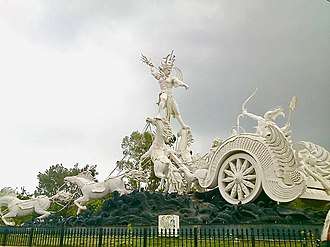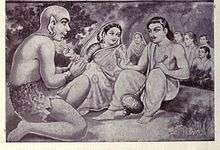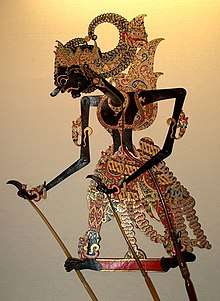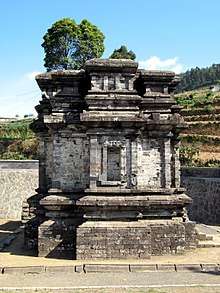Ghatotkacha
Ghatotkacha (Sanskrit: घटोत्कच, IAST: Ghaṭotkaca, literally: "Bald Pot") is an important character in the Mahabharata.[1] His name comes from the fact that his head was hairless (utkacha) and shaped like a ghatam.[2] Ghatotkacha was the son of the Pandava Bhima and the demoness Hidimbi.
| Ghatotkacha | |
|---|---|
The Mighty Son of Bhima | |
 Ghatotkacha standing on horses in a fight with Karna, an artwork in Kota, Rajasthan, India | |
| Devanagari | घटोत्कच |
| Affiliation | Half-rakshasa |
| Abode | Kamyaka Forest |
| Weapon | Gada (mace) |
| Battles | Kurukshetra War |
| Texts | Mahabharata |
| Personal information | |
| Born | |
| Died | |
| Parents | |
| Spouse | Ahilawati |
| Children | Anjanaparvan, Meghavarna, Barbarika |
He is the father of Anjanaparvan, Barbarika and Meghavarna. His second son Anjanaparvan participated in the war. His maternal parentage made him half-demon, which granted him several magical abilities such as the ability to fly, to increase or decrease in size and to become invisible. He was an important fighter from the Pandava side in the Kurukshetra war and caused a great deal of destruction to the Kaurava army on the fourteenth night. Ghatotkacha killed many demons like Alambusha and many gigantic Asuras. He was killed by Karna with Indra's Vasavi Shakti which Karna obtained in exchange for his earrings and armour.
Legends

Ghatotkacha was born to the demoness Hidimbi and the Pandava Bhima. When traveling the countryside with his brothers and mother as a brahmin, having escaped the lakshagraha, Bhima saved Hidimbi from her wicked brother Hidimba, the king of demons of Kamyaka Forest. Soon after Ghatotkacha was born, Bhima had to leave his family, as he still had duties to complete at Hastinapura.
Ghatotkacha grew up under the care of Hidimbi. Like his father, Ghatotkacha's weapon of choice was the mace. Lord Krishna gave him a boon that no one in the world would be able to match his sorcery skills, except for Krishna himself.[3] His wife was Ahilawati and his sons were Barbarika, Anjanaparvan, and Meghavarna.
Hidimbi's dinner request
One day Hidimbi asked Ghatotkacha to fetch a human to sacrifice to Kali Mata. On his way to do so, he spotted a Brahmin and his wife traveling with their three children. Ghatotkacha approached them and asked which one of them should come with him to be his mother's sacrifice to Kali.
The Brahmin offered himself but his wife insisted that she would go. Finally, their second son agreed to go with Ghatotkacha and asked his permission to first bathe in the river Ganga. Bhima comes upon the scene and inquired as to what was the matter. Ghatotkacha then relayed the scenario to Bhima, who agreed to go with him on the condition that Ghatotkacha should defeat him in a fight.
Fight with Bhima
The fight began with both father and son fighting barehanded. After days of fighting, both of them exhausted, they were stopped by Hidimbi. She informed Ghatotkacha that Bhima is his father. Ghatotkacha fell at the feet of his father Bhima who embraced and praised his son, telling him that seldom has he fought anyone who could match him in terms of strength. Bhima also criticizes his wife and son for following the practice of human sacrifice.he died that time
Kurukshetra War
In the Mahābhārata, Ghatotkacha was summoned by Bhima to fight on the Pandava side in the Kurukshetra War. Invoking his magical powers, he brought great havoc in the Kaurava army using his power of illusion, even scaring away warriors like Duryodhana and Karna. On the 14th night, Ghatotkacha comes into conflict with Ashwatthama, who was attempting to rally the fleeing soldiers. After dispelling Ghatotkacha's illusion, he managed to knock the demons unconscious. After coming to his senses, Ghatotkacha became furious and fought with Ashwatthama in a long duel. During the fight, both combatants used their celestial weapons, but the mighty asura wasn't able to withstand the attack of the other and was forced to flee.
After the death of Jayadratha on the fourteenth day, when the battle continued past sunset, Ghatotkacha truly shined; his powers were at their most effective at night as demons become endued with unlimited prowess, great might, and courage. Along with his asura troops, Ghatotkacha attacked the Kauravas at full power.
Eventually, a fight took place between Karna and Ghatotkacha. Upon seeing his efforts against the gigantic asura turn futile, Karna invoked his celestial weapons. Beholding a celestial weapon aimed at him, the foremost of all d used his illusion to surrounded the Kaurava army. Beholding that, all kings with their sons and combatants, fled in fear. Only one among them -- Karna -- proud of the power of his weapons and nobility, managed to destroy all of Ghatotkacha's illusions. At the same time, Karna was unable to force Ghatotkacha to withdraw. Ghatotkacha forged a fierce and terrible illusion into existence. He turned invisible and deceptively began to tear away large number of arrows and other celestial weapons at the Kaurava army, injuring Duryodhana in the process.
With no other option, and with the Kaurava army on the verge of revolt, Karna invoked into existence that terrible Shakti, which he had planned to use on Arjuna. Karna hurled the weapon at the sea destroying his illusion and piercing him before it returned to Indra.
Mortally wounded, Ghatotkacha rose to the sky. In the midst of dying, he managed to enlarge his body, crushing one akshauhini of the Kaurava army by his weight as he fell.[4] The Pandavas were filled with grief at Ghatotkacha's death, while Krishna with the cosmic knowledge smiled as Ghatotkacha lost the demon bhava and reach heaven.
Javanese version

The Kurukshetra War in Javanese wayang is usually called by the name Bharatayuddha. The story was adapted and developed from the script Kakawin Bharatayuddha written in 1157 during the time of the Kediri Kingdom (present day East Java, Indonesia). In the wayang puppet version, Ghatotkacha (locally spelled 'Gatotkaca') is very close to his cousin named Abimanyu, son of Arjuna. Abhimanyu married Utarra the daughter of Virata Kingdom, after he claimed he was a virgin. In fact, Abhimanyu was married to Sitisundari, daughter of Krishna. Sitisundari who is entrusted in the palace of Gatotkaca heard the news that her husband had remarried. Gatotkaca's Uncle, named Kalabendana, came to Abhimanyu to take him home (Kalabendana was Arimbi's youngest brother, a dwarf giant but with a plain and noble heart). This have made Utari jealous, and Abhimanyu was forced to swear that if he indeed had a wife other than Utari, he would be willing to die beaten by his enemies later on. Kalabendana met with Gatotkaca to report Abhimanyu's attitude. Gatotkaca actually scolded Kalabendana, which he considered presumptuously interfering in his cousin's household affairs. Out of impulse anger, Gatotkaca hit Kalabendana's head, and even though the act was carried out accidentally, Kalabendana was killed instantly.
When the Bharatayuddha war broke out, Abhimanyu was actually killed by the Kauravas on the 13th day. On the 14th day, Arjuna managed to avenge his son's death by beheading Jayadratha. Duryodhana was very sad over the death of Jayadratha, his own brother-in-law. He forced Karna to attack the Pandava camp that night. Karna obeyed even though this violates the rules of the war. After learning that the Kauravas launched a night attack, the Pandavas sent Gatotkaca to head off. Gatotkaca was deliberately chosen because Kotang Antrakusuma armor which he wears is able to emit bright light to shine on Kaurava's army. Gatotkaca successfully killed a Kaurava ally named Lembusa. Meanwhile two of his uncles, Brajalamadan and Brajawikalpa, died at the hands of their enemies, each named Lembusura and Lembusana.
Gatotkaca faced Karna, the wielder of Kontawijaya weapon. He created his twins as many as a thousand people to make Karna feel confused. On the instructions of his father, named Batara Surya, Karna managed to find the original Gatotkaca. He then released Konta weapon in the direction of Gatotkaca. Gatotkaca tried to evade this by flying as high as possible. But the spirit of Kalabendana suddenly appeared to catch Kontawijaya while delivering news from heaven that the death of Gatotkaca had been set that night. Gatotkaca surrenders himself to his fate and requests that his body would be used to kill Kaurava's armies. Kalabendana agrees, then stabbed Gatotkaca's navel using Konta weapon. The weapon merges back into its sheath, which is the mastaba wood still stored in Gatotkaca's gut. Gatotkaca dies, and the spirit of Kalabendana threw his body towards Karna which managed to jump to escape death. Karna's chariot was shattered to pieces as a result of being crushed by Gatotkaca's body, and the fragments of the chariot shot in all directions and killed the Kaurava soldiers who were around it.
Lineage
Ghatotkacha had 3 sons - Barbarika, Anjanaparvan and Meghavarna. The existence of Barbarika is debated as he is mentioned in the later additions tk the Skanda Purana, and not in the official renditions of the Mahabharata.
However, Ghatotkacha's Lineage is supposed to have extended longer. The royal family of the Dimasa Kingdom claimed descent from Ghatotkacha.
Temples

- There is a temple built in Champawat, Uttrakhand where it is meant his head fell after he was killed by Karna in the battle of Mahabharata.
- There is a temple built to honor Ghatotkacha in Manali, Himachal Pradesh near the Hidimba Devi Temple.
- An ancient 7th Century Hindu temple structure in Dieng Temples complex, Central Java is named as "Gatotkaca Temple" in honour of the Mahabharata character.
In popular culture
- A 2008 animated film Ghatothkach was based on his life. It was directed by Singeetham Srinivas Rao.[5]
- Ketan Karande played Ghatotkacha in 2013 TV Series Mahabharat.
- Razaq Khan played Ghatotkacha in 1988 TV Series Mahabharat.
- Since ancient until current modern Indonesia, Ghatotkacha has become a very popular pop culture figure and wayang puppet character, having its own version of stories told in the Javanese and Balinese version of Mahabharata story.
- In Javanese wayang, he is known as Gatotkoco with superhero fame and well known for the nickname the "Satria otot kawat balung wesi" ("Wire muscle and Iron bone Warrior").
- For Javanese and Balinese, Ghatotkacha is revered as a deity and popularly depicted in artworks and statues, such as the Satria Gatotkaca Park Statue in Kuta major road intersection in Bali.
- Gatotkaca have been frequently depicted in Indonesian popular culture such as music, comics and film, such as the superhero action film Satria Dewa: Gatotkaca (2020) .
- Javanese version of Ghatotkacha, known as Gatotkaca, depicted in Garudayana, an Indonesian comic series, is featured as a playable character in the game Mobile Legends: Bang Bang.
References
- Datta, Amaresh (1 January 2006). "The Encyclopaedia of Indian Literature (Volume Two) (Devraj to Jyoti)". ISBN 978-81-260-1194-0. Cite journal requires
|journal=(help) - "Archived copy". Archived from the original on 10 January 2007. Retrieved 3 December 2006.CS1 maint: archived copy as title (link)
- Dutt, Romesh. "Maha-Bharata, The Epic of Ancient Indi". Missing or empty
|url=(help) - Amar Chitra Katha #592, ISBN 9788184821994
- "Ghatothkach, Cannes-bound!". Rediff. Retrieved 5 June 2019.
